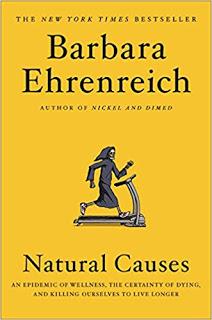
Published April 10, 2018.
Barbara Ehrenreich loans her considerable talent to the question, "How much control do we have over our longevity?"The result is her April 10, 2018 book, Natural Causes: An Epidemic of Wellness, the Certainty of Dying, and Killing Ourselves to Live Longer.
As a gerontologist and a self-professed health nut, I was attentive to her claim that we have a lot less control over our health than we (middle class people from industrialized nations) like to admit.
Her first few chapters describe the escalating number of diagnostic tools and treatments.
Increased health is primarily available to those with health insurance and the means to pay for premiums, co-pays, and deductibles--as well as to those who can go the extra mile and pay for gym memberships, meditation programs and organic produce.
But does throwing money at the aging body really result in longevity? Ehrenreich argues that it does not.
The body is subject to decay on the level of systems, organs, and even on the cellular level. Her graduate research for a Ph.D. in cellular immunology comes into play for a good portion of the book where she describes the internal warfare that occurs within the body, particularly as conducted by microphages. This section of the book gets quite technical, but it supports her overall argument: every person's body is subject to decay and finally death.
We cannot adopt a diet, an exercise program, or a medical intervention that will save us from death. And we don't have a guarantee that these interventions will even prolong the quality and length of our life. In fact, some of our "health-seeking" activities actually increase damage to the body.
We adopt the illusion of control. We give too much power to the health care system. And much of our health-seeking behavior is driven by emotion rather than science.
Ehrenreich's observations are interesting. However, I felt a little clobbered by her tone and her dogpiling of evidence.
The writing takes on an extreme tone of skepticism; the word choice of often scathing. And the research showing the ineffective nature of many medical practices came off like a kangaroo court.
Because 80% of her book takes this tone of skepticism, I admit that after reading the first third of the book, I skipped to the conclusion out of curiosity. She was tearing down so many things, I was wondering if there would be anything left standing after the dust settled. (I did go back and read the entirety of the book.)
Her conclusion takes an odd turn towards a neurologically based transcendence of mortality.
Ehrenreich describes the effects of psychedelic drugs to achieve a destruction of the self that confronts death and moves beyond the self to a place where all the universe is without division. (See what I mean about an odd turn?)
A few years ago I, too, started reading a lot about spirituality after becoming a gerontologist and realizing the futility trying to keep Father Time and the Grip Reaper from their work. For the last few years, I have read more books about transcending the limits of mortality. I have also noticed more people finding my blog by using the terms "spirituality and aging." (See the tag "spirituality" on the blog for some of the results of my readings.)
Ehrenreich is not advocating for meditation / mindfulness. In fact, earlier in the books, she has a section that devalues "mindfulness" as hogwash, so she can't leave use that in her conclusion. Instead, she describes a similar transcendence available through drugs rather than through a spiritual-philosophical-metaphysical quest.
Psychedelic drug use is an interesting path towards transcendence of the material self. This is an avenue I've seen explored recently in other places as a treatment for depression and addiction. Who am I to say this won't work to allieviate our fears over the destruction of the self through illness, decay, and death? I'm not willing to be a test subject, but I will be watching for research about the healing powers of LSD and psilocybin
I am not sorry that I read the book. Her skepticism serves as an interesting counter balance to the many unrealistic claims made for increased longevity. Her book is great at dismantling false hope, but not very strong in developing a space for making meaning with the limited life we mortals possess.
Related:
Books on Aging and Spiritual Growth

